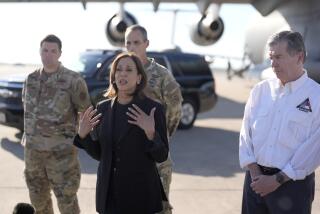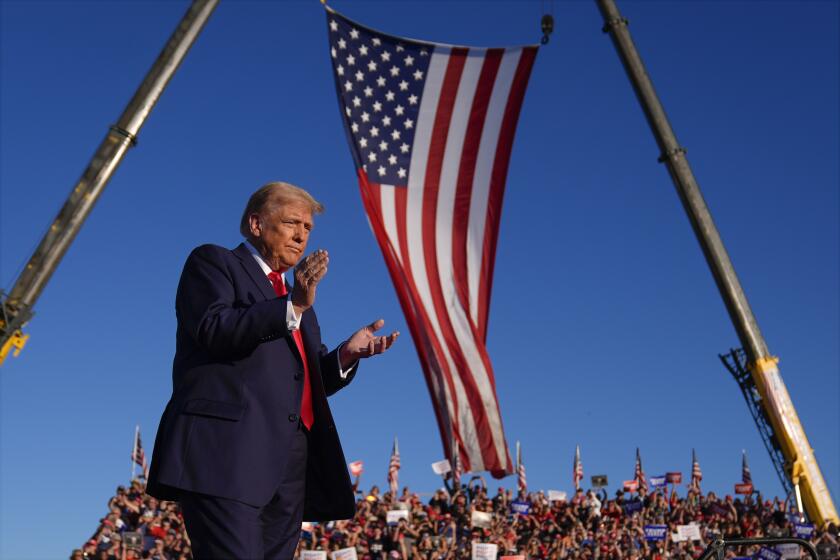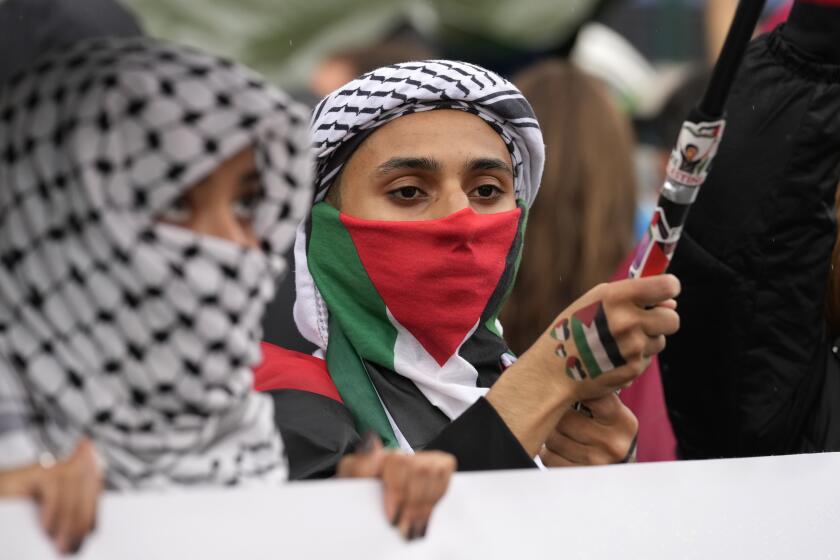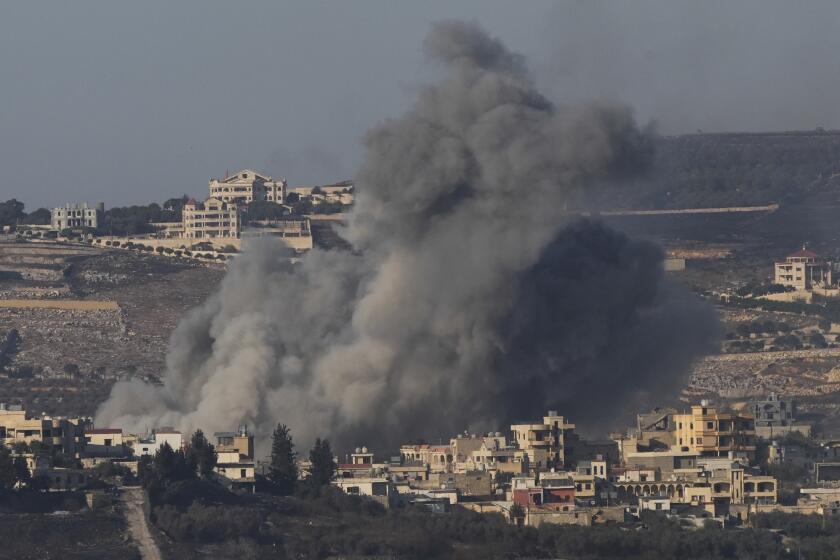Iran Asks Help to Cope With Fleeing Kurds
Iran has asked for international assistance to cope with the influx of more than 1 million Kurdish refugees--many suffering from illness, exposure and hunger--massed in the last three days on its border with Iraq, the official Iranian news agency reported Thursday.
Iranian Foreign Minister Ali Akbar Velayati has called for help from the Office of the U.N. High Commissioner for Refugees and the International Red Cross to help with the huge flow of refugees fleeing Iraqi military forces, the Islamic Republic News Agency reported.
Meanwhile, an angry President Bush insisted that “I have not misled anybody” about whether the United States would support the uprisings in northern and southern Iraq.
“It was never a stated objective of the coalition to intervene in the internal affairs of Iraq,” Bush said during a joint press conference with Japanese Prime Minister Toshiki Kaifu in Newport Beach, Calif.
Most of the Kurdish refugees came to the western Iranian frontier town of Nowsoud, the Iranian news agency said. Thousands more were reported to be moving toward the border in caravans of cars and horse-drawn vehicles.
According to Velayati, the Iranian government will accept all who ask for shelter.
“Our borders are open to all refugees,” Velayati said, “be they Afghan, Iraqi or Kuwaiti.”
Turkey closed its border to the Kurds on Wednesday, although some refugees continue to slip across remote frontier areas or swim border rivers.
In other developments:
Kurdish leader Masoud Barzani urged his rebels to “die fighting rather than live as refugees in Iran or Turkey.”
Turkish President Turgut Ozal called on the Gulf War allies to consider military action against Iraq to avert what he called “genocide” of the Kurds by Iraqi troops. Ozal said at least 100,000 Kurds fleeing Iraq after the crushing of a monthlong rebellion have been allowed to cross into Turkey to escape advancing government forces.
At the United Nations, the Security Council met behind closed doors to consider a sweeping and unprecedented resolution condemning Iraq for its repression of the Kurds.
Britain pledged $35 million in immediate humanitarian aid to the masses of Kurds fleeing Iraq. Prime Minister John Major said Britain is working to send relief supplies, starting with an emergency airlift to Turkey today.
The Iranians
This is not the first time Iran has dealt with such a large migration. During the 11-year civil war in Afghanistan, Iran hosted more than a million Afghan refugees, mainly in camps on its eastern border near the Afghan city of Herat. Iran also has given refuge to tens of thousands of Shiite Muslim refugees fleeing conflicts in southern Iraq between Shiite rebels and the largely Sunni Muslim Iraqi military.
Foreign Minister Velayati also accused Iraq of firing Scud missiles at its own civilians during the monthlong civil war that broke out after Baghdad’s defeat in the Gulf War.
Velayati spoke at a news conference late Wednesday after meeting with Foreign Ministers Gianni De Michelis of Italy, Jacques Poos of Luxembourg and Hans van den Broek of the Netherlands.
The three are in Iran to discuss Iraq’s civil war, future security plans for the Persian Gulf region and the plight of Western hostages in Lebanon.
The refugees who began massing on the Iranian frontier on Tuesday were mostly from Sulaymaniyah, the last Kurdish stronghold to fall to Saddam Hussein’s army, and the Iranian news agency said they did not have food or shelter to survive for long.
The Americans
Bush’s comments were his first public defense against critics who charge him with having abandoned those who rebelled against Hussein.
The critics, including some Democrats and many prominent commentators on the Middle East, have accused Bush of abandoning both the Kurdish and Shiite insurgents by first urging Iraqis to overthrow Hussein and then refusing to use the U.S. military to support the rebellions.
On Thursday, his voice rising and face growing red, he strenuously rejected the charges.
“I don’t think the Shiites in the south, those who are unhappy with Saddam in Baghdad, or the Kurds in the north ever felt that the United States would come to their assistance to overthrow this man,” Bush said.
“I condemn Saddam Hussein’s brutality against his own people,” he said. But, he added, his voice rising, “I do not want to see U.S. forces, who have performed with such skill and dedication, sucked into a civil war in Iraq.
“I don’t think there’s a single parent of a single man or woman that has fought in (Operation) Desert Storm that wants to see U.S. forces pushed into this situation, brutal, tough, deplorable as it is.”
The United States is “concerned about the brutal treatment of the Shiites,” Bush said. “Do we hurt when Kurdish people are hurt and killed and brutalized? Yes.”
But, he added, “we’re not going to get sucked into this by sending precious American lives into this battle. We’ve fulfilled our obligations.”
In Washington, the State Department said that President Hussein’s military is now in control of all the major towns in Iraq but must maintain a heavy security presence and that scattered clashes continue.
Department spokesman Richard Boucher also said the United States would participate in a multinational program of economic assistance to Turkey and Iran to meet the cost of supporting refugees who have fled the civil war in Iraq. He said Washington has put up $7.6 million in money and food supplies as part of an initial collection of $63 million, most of it coming from Japan.
Boucher noted that the Administration had urged Turkey to keep its border with Iraq open but that Ankara had refused.
The Kurds
Kurdish leader Barzani appeared at a rally in a town still held by the rebels in the snow-capped mountains of northern Iraq, the Associated Press reported.
“We must stay and protect our land,” Barzani told several thousand Kurds, who chanted, “Death or victory!”
As he spoke, as many as 2 million Kurdish refugees--out of the estimated 4 million Kurds in Iraq--were reported fleeing north and east from Kurdish-populated cities recaptured by Iraqi government forces in the last week.
Several deaths have been reported among Kurdish women and children from exposure and starvation. Most of the refugees are without food or shelter in the rugged mountains.
The Iraqis
On an Iraqi government radio broadcast monitored in Nicosia, a senior official claimed that the Iraqi resistance had been crushed. “This day is the moment in which the valiant crushed the last part of deception,” said Izzat Ibrahim, a member of the ruling Revolutionary Command Council.
Meanwhile, other Iraqi officials broadcast appeals for fleeing Kurds to return. “We call on all those who left their homes to come back safely to their cities and villages,” said one announcement, broadcast on Iraqi radio Wednesday night. A report by the official Iraqi News Agency said the government was offering amnesty to soldiers who had deserted the armed forces in the Zahku region, center of the Kurdish rebellion.
The Iraqi government newspaper Al Jumhouriyah accused Iran and the intelligence agencies of Israel, Germany and Britain of fomenting the Kurdish revolt.
Interior Minister Ali Hassan Majid, quoted in the paper, said all four were involved in the “bloody rioting and sabotage” in Iraq after the end of the Gulf War.
He said Iraq possessed “important documents proving” its accusations and added that the army has seized Iranian weapons and government vehicles with saboteurs from the north.
The Turks
When Turkey closed its frontier with Iraq on Wednesday, it said it was unable to handle the the flood of Kurdish civilian refugees, estimated at between 250,000 and 1 million, trapped in the frozen mountain land north of Mosul, a major Iraqi oil center.
Turkey’s President Ozal, interviewed on British television, said his country risks being overwhelmed by the flood of refugees fleeing possible reprisals from Hussein’s army.
Asked whether he was prepared to see the countries that fought Iraq in the Gulf War to liberate Kuwait take up arms again to protect the Kurds, he said: “Yes, I think everybody should consider (it). . . . This is a kind of genocide.”
The United Nations
The resolution being considered by the Security Council demands a halt to the slaughter in Iraq and insists that Hussein’s government open Iraqi borders to international humanitarian organizations intent on carrying aid to the victims.
But the resolution, which has the support of the United States and Britain, troubles some delegates because it would draw the Security Council into the internal problems of a country.
To meet this objection, the French resolution maintains that “the massive flow of refugees” toward the Turkish and Iranian frontiers “threatens international peace and security in the region.”
After discussing the issue for three hours, the council adjourned, planning to vote on it today.
Times staff writers David Lauter in Newport Beach, Norman Kempster in Washington and Stanley Meisler and John Goldman at the United Nations contributed to this report.
KURDS: PEOPLE IN SEARCH OF A NATION
“The Kurds have no friends.” --Kurdish proverb GEOGRAPHY / PEOPLE
Kurdistan, the dreamed-of national home for the Middle East’s 25 million Kurds, has been called the world’s longest lost cause.
The Kurds are spread over a mountainous area Southwest Asian region of 74,000 square miles encompassing parts of Iraq, Turkey, Iran, Syria and the Soviet Union--all with governments that have no intention of granting them autonomy. They have never formed a truly independent state.
Ethnically close to the Iranians, the Kurdish-speaking people were traditionally nomadic herdsmen who are now mostly semi-nomadic. The majority are Sunni Muslims.
HISTORY
The Kurds have long fought their more powerful neighbors, battling the Greeks in the 4th Century BC and supplying the Arab world’s greatest general, Saladin, who opposed the Crusaders in the 12th Century.
The region informally known as Kurdistan was held by the Seljuk Turks in the 11th Century, by the Mongols from the 13th to 15th century and by the Ottoman Turks until the end of World War I. When the Ottoman Empire was dissolved, hope for an independent Kurdistan was born, but the region was soon carved up between the surrounding countries. At the end of the Second World War, a Soviet-backed Kurdish “republic” existed briefly in Iran.
Most of the nations touched by Kurdistan have ruthlessly repressed moves toward local autonomy among the Kurds within their borders.
ORGANIZATIONS
The main political parties are Mustafa Barzani’s Kurdish Democratic Party, founded in 1946, now led by his son Massoud; and the Patriotic Union of Kurdistan, set up in 1975 as a splinter faction led by Jalal Talabani. There are also two smaller parties, the Kurdistan Socialist Party in Iraq and the Kurdistan People’s Democratic Party.
The Iraqi Kurdistan Front is an umbrella grouping of the various Kurdish political groups plus the Kurdish guerrillas fighters, who are now battling Iraqi troops in a rear-guard action as they retreat from the cities of Kirkuk and Arbil.
RECENT EVENTS
Following the 1979 rebellion that overthrew the Iranian monarchy, the clergy-led government of Iran brutally put down rebellious Kurds on their side of the border, in and around the city of Sanandaj.
In 1988, during the Iran-Iraq War, the Saddam Hussein regime in Baghdad ordered the Kurdish mountain village of Halabja bombed with poison gas on the grounds that the residents might have helped Iranian invaders.
In Turkey--where at various times it has been a crime to speak or write Kurdish or play Kurdish music--the government of Turgut Ozal surprised the world this month with the announcement that it has held talks with Kurdish leaders.
Compiled by Times staff writer William Tuohy
More to Read
Sign up for Essential California
The most important California stories and recommendations in your inbox every morning.
You may occasionally receive promotional content from the Los Angeles Times.










